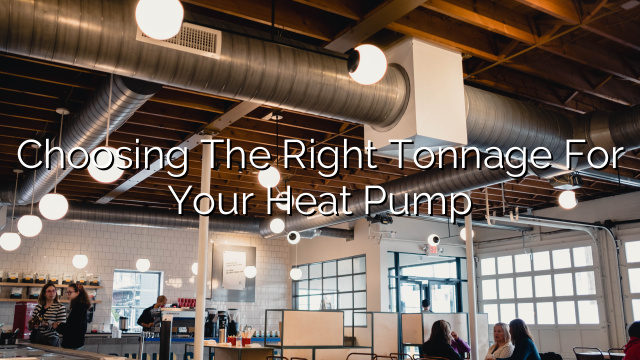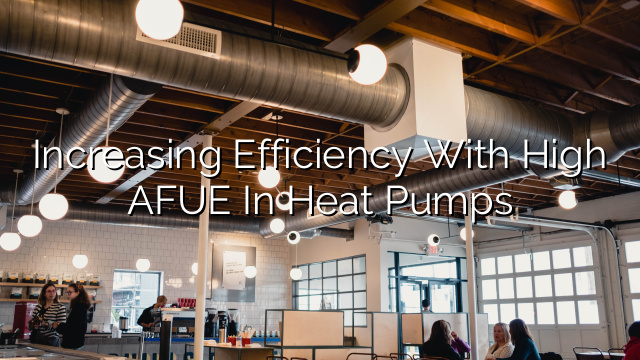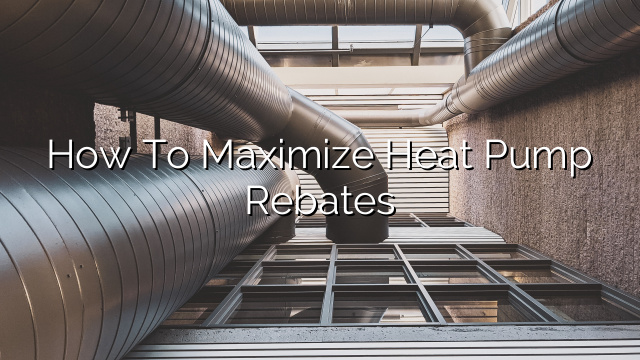Introduction
When it comes to choosing the right heat pump for your home, one of the most important decisions you will need to make is selecting the correct tonnage for your system. The tonnage of a heat pump refers to its cooling capacity, and it is crucial to choose a tonnage that is appropriate for the size and layout of your home. In this article, we will explore the factors to consider when determining the right tonnage for your heat pump and provide helpful tips to guide you through the decision-making process.
Understanding Heat Pump Tonnage
The tonnage of a heat pump is a measurement of its cooling capacity, which is typically expressed in tons. One ton of cooling capacity is equivalent to the ability to cool 12,000 BTUs (British Thermal Units) of air in one hour. The higher the tonnage, the greater the cooling capacity of the heat pump.
It is important to note that the tonnage of a heat pump is not related to its physical weight. Instead, it refers to the amount of heat that can be removed from a space in one hour. Choosing the right tonnage for your heat pump is essential to ensure that your home stays comfortable and energy-efficient.
Factors to Consider
When determining the right tonnage for your heat pump, there are several factors to take into account:
- Size of your home: The size of your home is a crucial factor in determining the appropriate tonnage. A larger home will require a higher tonnage to effectively cool the entire space, while a smaller home can typically suffice with a lower tonnage.
- Insulation: The level of insulation in your home will also impact the tonnage required. Well-insulated homes are more energy-efficient and may require a lower tonnage compared to poorly insulated homes.
- Climate: The climate in which you live plays a significant role in determining the tonnage needed for your heat pump. Hotter climates typically require a higher tonnage to cool the space effectively.
- Number of occupants: The number of people living in your home can affect the tonnage required. More occupants generate more heat, which may necessitate a higher tonnage to maintain a comfortable indoor temperature.
- Windows and sunlight exposure: The number of windows in your home and their exposure to sunlight can impact the cooling load. Homes with more windows and greater sunlight exposure may require a higher tonnage.
- Layout and design: The layout and design of your home also play a role in determining the appropriate tonnage. Homes with multiple levels or open floor plans may require additional tonnage to ensure even cooling throughout the space.
Choosing the Right Tonnage
Now that you understand the factors to consider, let’s explore how to choose the right tonnage for your heat pump:
- Calculate the cooling load: Start by calculating the cooling load of your home. This can be done by considering the factors mentioned earlier and using online calculators or consulting with a professional HVAC technician.
- Refer to industry guidelines: The Air Conditioning Contractors of America (ACCA) provides industry guidelines for selecting the appropriate tonnage based on square footage. These guidelines can serve as a helpful starting point in determining the right tonnage for your home.
- Consult with a professional: It is always a good idea to consult with a professional HVAC technician to assess your specific needs and provide expert advice on selecting the right tonnage for your heat pump. They can perform a cooling load calculation and take into account other factors unique to your home.
- Consider energy efficiency: While it may be tempting to choose a higher tonnage to ensure sufficient cooling, it is important to consider energy efficiency. An oversized heat pump can lead to increased energy consumption and higher utility bills. Striking the right balance between capacity and efficiency is crucial.
- Review the heat pump’s specifications: Once you have determined the appropriate tonnage for your home, review the specifications of different heat pump models to ensure they meet your requirements.
Frequently Asked Questions
Q: Can I install a heat pump with a higher tonnage than my requirement?
A: While it is technically possible to install a heat pump with a higher tonnage than your requirement, it is not recommended. An oversized heat pump will cycle on and off more frequently, resulting in decreased efficiency, increased wear and tear, and higher energy consumption.
Q: Can I install a heat pump with a lower tonnage than my requirement?
A: Installing a heat pump with a lower tonnage than your requirement may result in inadequate cooling and reduced comfort. It is important to choose a tonnage that can effectively handle the cooling load of your home.
Q: Should I rely solely on square footage to determine the tonnage?
A: While square footage is a good starting point, it is not the only factor to consider when determining tonnage. Other factors such as insulation, climate, and layout should also be taken into account. Consulting with a professional HVAC technician can provide a more accurate assessment.
Q: How long does a heat pump last?
A: The lifespan of a heat pump can vary depending on factors such as usage, maintenance, and quality of installation. On average, a well-maintained heat pump can last between 10 to 15 years.
Q: Can I install a heat pump myself?
A: Installing a heat pump requires specialized knowledge and skills. It is recommended to hire a professional HVAC technician to ensure proper installation, optimize performance, and maintain the manufacturer’s warranty.
Conclusion
Choosing the right tonnage for your heat pump is a crucial step in ensuring the comfort and energy efficiency of your home. By considering factors such as the size of your home, insulation, climate, and layout, you can determine the appropriate tonnage and make an informed decision. Remember to consult with a professional HVAC technician for expert advice tailored to your specific needs. With the right tonnage, your heat pump will effectively cool your home and provide a comfortable living environment for years to come.














